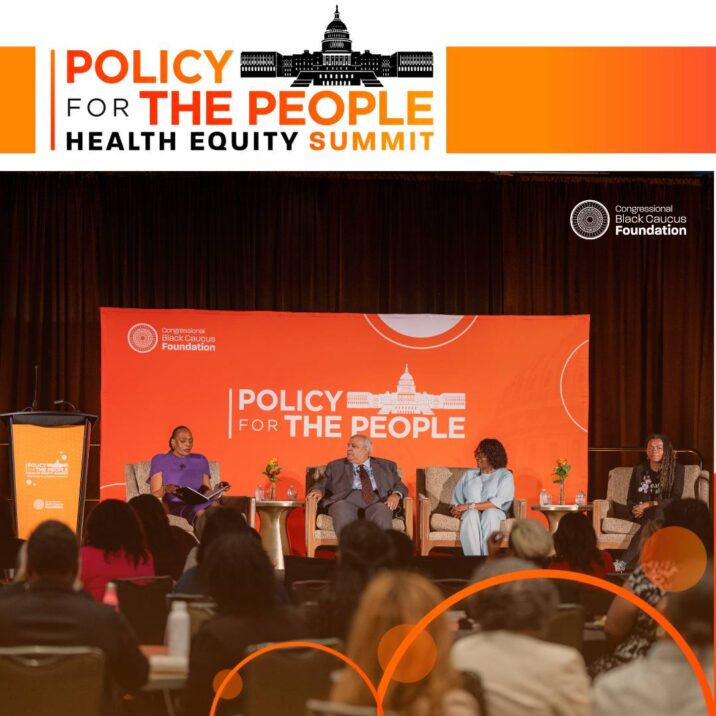Media Contact:
Yolanda Raine
Vice President, Marketing and Communications
media@cbcfinc.org
202-809-2011
Washington, D.C. – Yesterday, the Congressional Black Caucus Foundation (CBCF) held its Policy for the People Health Equity Summit, a prominent convening of policymakers, thought leaders, advocates, and community members committed to engaging in dynamic discussions on advancing equitable policies to address the needs of Black communities. The summit illuminated challenges and areas of opportunity in diversifying clinical trials, cultural competence in healthcare, access and affordability, artificial intelligence (AI), and other emerging healthcare technologies.
In follow up to health equity conversations at the CBCF’s September 2023 Annual Legislative Conference, Nicole Austin-Hillery, President and CEO of the CBCF shared the need for continued “check-ups” on structural health disparities that still exist. “There is still so much work to be done, and the people in this room are some of the most brilliant minds developing solutions,” said Austin-Hillery.
“Racism and discrimination continue to be pervasive throughout our society. They still influence how people perceive themselves in and out of our healthcare system. Until we deal with unconscious bias, we won’t see any progress.” said Dr. Georges C. Benjamin, Executive Director of the American Public Health Association.
Through the onsite health fair, attendees connected with companies and community organizations focused on improving health, welfare and care access for the Black community. The event also featured in-depth content sessions. Highlights from those sessions included:
Empowering Black Voices: Diversifying Clinical Trials Through New Technologies
- The lack of diversity in clinical trials has created a notable gap in data collection among Black communities but there is opportunity for awareness campaigns and emerging technologies to help address those shortfalls.
- “Sixty percent of the U.S. population is white Americans, but when you look at people who participate in clinical trials, 75 percent are white,” said Courtney Christian, Deputy Vice President of Policy and Research at PhRMA.
- “Clinical trials are needed to understand how well [treatment options] work, and we really need people to participate in them to ensure efficacy,” said Marcus Dortch, Director of DEI in Clinical Trials, Medical Affairs at Johnson & Johnson Innovative Medicine.
Cultivating Equitable Care: Cultural Competence and Cardiovascular Health in Black Communities
- Meeting patients where they are, with deep cultural consideration, can lead to better health care communication and therefore better patient outcomes.
- “A lot of our biases are cultural and socioeconomic, and we need to turn the lens inward to suspend those biases so we can provide high-quality care,” said Dr. Sara D. Collins, Co-Chair and Medical Director of the Association of Black Cardiologists Health and Public Policy Committee.
- Diverse staff, comprehensive metrics and an empathetic approach are essential elements for culturally competent care.
Breaking Barriers in Healthcare: Advancing Access and Affordability for the Black Community
- Policies, such as the Affordable Care Act, have moved us forward but there is still significant work to be done.
- “We need education for the next generation, and we need to point out system injustices in policy,” said Dr. Ala Stanford, Founder of the Black Doctors Consortium. “When our approach to health care is less accusatory and more understanding of patient needs, patients tend to be more receptive.”
- “Women and people of color are in positions of influence more than ever before. Their presence in the rooms and conversations that matter allows us to spark further change. They are standing in the gap and driving conversations and solutions forward,” said Keon L. Gilbert, Professor at Saint Louis University’s College for Public Health and Social Justice Fellow at The Brookings Institution.
To learn more about the Policy for the People Health Equity Summit visit our website.
###
About CBCF
Established in 1976, the Congressional Black Caucus Foundation, Inc. (CBCF) is a non-partisan, nonprofit, public policy, research, and educational institute committed to advancing the global Black community by developing leaders, informing policy, and educating the public. For more information, visit cbcfinc.org.
